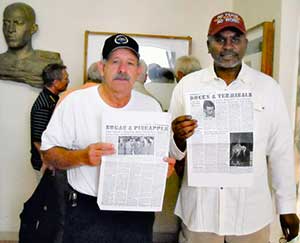ILWU’s history filled with international solidarity
By
Clarence Thomas
Havana, Cuba
Published Jun 3, 2009 1:15 PM
The largest 2009 May Day celebration held anywhere in the world, according
to CNN, took place at the Plaza de la Revolución in Havana, Cuba. Past
ILWU international president David Arian and former Local 10
secretary-treasurer and Million Worker March leader Clarence Thomas were part
of a U.S. delegation, which also included International Longshore Association
members. Arian is currently the secretary-treasurer of the Harry Bridges
Institute in San Pedro, Calif.
The ILWU has been guided by the principle that solidarity with workers of all
lands is sound union policy. To demonstrate this ILWU has sponsored overseas
delegations of rank-and-file members and has, in turn, hosted trade union
visitors from every continent. Long ago the union came to the conclusion that
if it was to know and understand the labor movement on a global scale it would
have to obtain this information first hand.
|
At Jesus Menendez Museum, past ILWU Int’l.
Pres. Dave Arian and Clarence Thomas from
ILWU Local 10 hold union newsletters dated
1947 picturing the Cuban sugar workers’
leader and stating, “Sugar Industry plagued
by Misery and Privation … Burdened by
Heritage of Slavery.”
Photo: Delores Lemon-Thomas
|
ILWU-CTC history of solidarity
Our delegation did just that during our 12-day visit in Havana, Cuba, but it is
also something that is deep in ILWU’s history of solidarity. This was not
the first time longshore workers met with their Cuban counterparts. The
ILWU-Cuban solidarity work started in the years leading up to the 1959
socialist revolution. After World War II, ILWU members visited the Philippines,
Cuba, Mexico and Puerto Rico to strategize and share information and knowledge
on how to strengthen labor solidarity with sugar workers.
In 1947, the ILWU participated in the organizing of the International Sugar
Workers Committee. The initial meeting took place in Havana, Cuba. The
ILWU’s Louis Goldblatt was elected chairman. Jesús Menéndez,
head of the Cuban Sugar Workers representing 350,000 workers, was elected
vice-chair. A plan of action was adopted to stop the exploitation of workers by
the international sugar cartel.
The following year Menéndez, who was a member of Cuban Congress and the
Communist Party, was assassinated while on an inspection tour of sugar mills
with which his union had contracts. In the February 1948 issue of the ILWU
Dispatcher, Secretary-Treasurer Louis Goldblatt said the killing was the
logical outcome of the U.S. Department of State policies, which were
subservient to U.S.-based sugar companies.
Goldblatt added, “The murder was part and parcel of the [colonial] Cuban
government, [U.S.] American sugar interests, and the U.S. State
Department’s plan to destroy the unions and eliminate any vestige of
democracy in Cuba.”
This history came alive when the delegation visited the Menéndez home, now
a museum. The curator showed documents that were donated by the ILWU library
and presented to the museum by Local 10 member Jack Heyman during his visit in
2001. While there, ILWU members recounted the history of ILWU and the Cuban
sugar workers solidarity. They discussed how the ILWU organized a concert tour
for famed singer and humanitarian Paul Robeson in Hawaii. Money from the tour
was donated to Menéndez’s surviving family.
U.S. port workers say ‘Free the Five’
In more recent solidarity, ILWU Local 10 sent a strong letter to President
Barack Obama urging him to look into the case of the Cuban Five and free them
and also grant visas for Olga Salanueva and Adriana Pérez, who have been
cruelly prevented for nearly a decade from visiting their spouses René
González and Gerardo Hernández, two of the five. Local 10’s
letter is an important part of the growing international labor involvement in
the struggle to free the Cuban Five—who also include Ramón
Labañino, Antonio Guerrero and Fernando González.
The letter and resolution were inspired last December when unionists met Magali
Llort, mother of Fernando González, at the Fifth International Cuba/Latin
America/North America/Mexico Labor Conference in Tijuana, Mexico, sponsored by
the U.S./Cuba Labor Exchange. While in Cuba, the longshore workers and other
English-speaking labor delegations from Ireland, Australia, Britain and the
U.S. met with the families of these five heroic Cuban brothers.
The U.S. Supreme Court is expected to announce in mid-June whether it will hear
the appeal of the Five. This impending decision has spurred plans to intensify
labor outreach at upcoming union conventions.
At the recent Summit of the Americas in Trinidad and Tobago, Latin American and
Caribbean nations called for an end to the U.S. blockade against Cuba. The ILWU
has opposed trade sanctions against Cuba, policies that punish workers and
their families and ultimately aggravate international peace. It is good for
workers to meet with workers.
Articles copyright 1995-2012 Workers World.
Verbatim copying and distribution of this entire article is permitted in any medium without royalty provided this notice is preserved.
Workers World, 55 W. 17 St., NY, NY 10011
Email:
[email protected]
Subscribe
[email protected]
Support independent news
DONATE


